As we
reported last week, 2,700 of the world's biggest brains descended
upon New York City from January 31 to February 4, 2002, for the
World Economic Forum. Similar events in Seattle and Genoa had drawn
violent protests; in the post 9.11 New York City, such a prospect
was met with trepidation. Perhaps responding to this, the WEF made
it clear in its media releases that it proposed
to bring into discussion issues, such as workers' rights
and the environment, that are of concern to activist groups. Bill
Gates, the Corporate Motherfucker poster-boy himself, was quoted
as saying: "People who feel the world is tilted against them
will spawn the kind of hatred that is very dangerous for all of
us. I think it's a healthy sign that there are demonstrators in
the streets. They are raising the question of 'is the rich world
giving back enough?' "
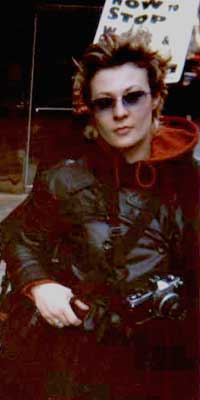 For
the 7,000 protestors who showed up, however, the answer was "no."
Staging loud, yet, for the most part, non-violent protests, activists
representing a bewildering variety of causes rallied in the streets
outside the Waldorf-Astoria hotel where the forum was being held.
The New York Police Department kept a watchful eye on the proceedings,
channeling the dissenters into clearly delineated areas and diverting
traffic around the hotel.
For
the 7,000 protestors who showed up, however, the answer was "no."
Staging loud, yet, for the most part, non-violent protests, activists
representing a bewildering variety of causes rallied in the streets
outside the Waldorf-Astoria hotel where the forum was being held.
The New York Police Department kept a watchful eye on the proceedings,
channeling the dissenters into clearly delineated areas and diverting
traffic around the hotel.
Since
dissent against The Man is the theme of this Web 'zine, it was,
of course, imperative that we cover the event. The anti-globalization
movement has attracted much media attention. However, mainstream
sources have often presented the situation in the black-and-white
of a medieval mystery play, often giving undue, sensationalistic
attention to the radical anarchists who vandalize Starbucks and
McDonalds. Such portrayals simply didn't ring true. We wished to
present the event in as a non-biased a manner as possible, presenting
opinions and statements from both the protestor-on-the-street (instead
of the "leaders" usually quoted by the press) and police.
Our reasons for eschewing speaking to the organizers were several.
First of all, we weren't sure how much what they said represented
the feelings of the whole. Furthermore, speaking to a few people
with an agenda can be misleading. This was supposed to be a popular
movement; we wanted to speak to the people.
So that
we can present images along with the text, I recruited my friend
Bea,
who, besides being beautiful is an extremely talented photographer
(that's a picture of her on the right, taken with my crappy disposable
camera). All pictures on these pages, except where noted, were taken
by Bea.
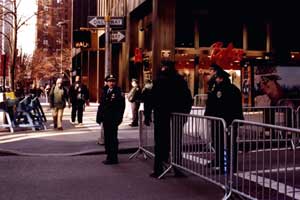 We
arrived at 50th and Park Avenue at 10:00 a.m. on a freezing cold
morning to find the streets empty, save for barricades and police.
Undaunted, we began to conduct a reconnaissance, checking where
the protests would be and taking pictures of the security set-up.
The public space was sectioned off very clearly, with police politely,
yet firmly, asking passers-by for identification to enter restricted
areas. This caused no end of trouble for the various residents,
delivery people, and housecleaners going about their business. The
large, modern office buildings were likewise closed off with steel
barricades across their entrances. Locked down tight, this urban
canyon of concerete and steel presented only bare glass and stone
facades, giving the street a profoundly claustrophobic feel. And,
everywhere you looked, there were cops.
We
arrived at 50th and Park Avenue at 10:00 a.m. on a freezing cold
morning to find the streets empty, save for barricades and police.
Undaunted, we began to conduct a reconnaissance, checking where
the protests would be and taking pictures of the security set-up.
The public space was sectioned off very clearly, with police politely,
yet firmly, asking passers-by for identification to enter restricted
areas. This caused no end of trouble for the various residents,
delivery people, and housecleaners going about their business. The
large, modern office buildings were likewise closed off with steel
barricades across their entrances. Locked down tight, this urban
canyon of concerete and steel presented only bare glass and stone
facades, giving the street a profoundly claustrophobic feel. And,
everywhere you looked, there were cops.
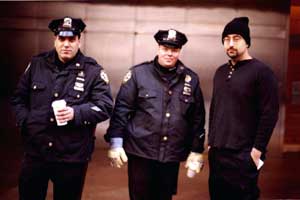 With
no protestors to speak to, we decided to interview the omnipresent
police. The officers at the barricades were unwilling or unable
to talk, but others were more forthcoming. One NYPD officer, who
asked to remain anonymous, reveled that he had no enmity for the
protestors. In fact, we found quite a bit of common ground: We're
both descended from union organizers, who were the radicals of their
day. Nor did he seem to have any prejudiced views of the progressive
community himself; when asked what he expected of the protestors,
the officer gave a reply and resident of the Big Apple might have
voiced: "They're all probably spoiled suburban college students
from the Midwest. New Yorkers have better sense."
With
no protestors to speak to, we decided to interview the omnipresent
police. The officers at the barricades were unwilling or unable
to talk, but others were more forthcoming. One NYPD officer, who
asked to remain anonymous, reveled that he had no enmity for the
protestors. In fact, we found quite a bit of common ground: We're
both descended from union organizers, who were the radicals of their
day. Nor did he seem to have any prejudiced views of the progressive
community himself; when asked what he expected of the protestors,
the officer gave a reply and resident of the Big Apple might have
voiced: "They're all probably spoiled suburban college students
from the Midwest. New Yorkers have better sense."
 In the
meantime, a more pressing issue than global capitalism had reared
its head: I had to go to the bathroom. Badly. Standing in the gusts
of freezing wind, the situation was growing desperate. Did I go
against my principles by venturing into a nearby Starbuck's? Would
that not brand me a traitor to the very people we had come to observe?
Was my bladder not about to explode?
In the
meantime, a more pressing issue than global capitalism had reared
its head: I had to go to the bathroom. Badly. Standing in the gusts
of freezing wind, the situation was growing desperate. Did I go
against my principles by venturing into a nearby Starbuck's? Would
that not brand me a traitor to the very people we had come to observe?
Was my bladder not about to explode?
Cautiously,
we ventured into the belly of the beast itself. The coffee shop
was deserted, save for some police protecting the place from any
anarchists who might have wanted to start their morning by smashing
a cappuccino machine. The cops gave us a curious once-over as Bea
documented my radical act of unlocking the bathroom door, and then
went back to drinking their lattes. Alas, I didn't perform a single
act of resistance; I even flushed and washed my hands. However,
I did discover that big, soulless businesses are good for one thing:
relieving oneself in the middle of Manhattan. You can't beat them
for convenience.
Some
police helpfully told us that the demonstrators were supposed to
march from Columbus Circle to the Waldorf, so we started walking
north and west in hopes of finding some more profitable way of amusing
ourselves than pissing on corporate property. We hadn't gone two
blocks when we ran into three young men sporting the Guatemalan
parkas, unshaven growths of beards, and matted dreadlocks that identify
dedicated counterculturalists. One carried a sticker-festooned empty
Poland Spring water jug. We introduced ourselves and asked them
who they were and what they were doing here. The three gentlemen
were hesitant to answer at first, but the one with the jug, who
asked to be identified only as Grinning White Bozo, was eventually
coaxed into responding.
"I
was hoping to have a little fun, get people dancing in the streets,"
he said. "I'm a pacifist, so I try to go with the vibes."
I pointed
to the water jug.
"Are
you soliciting donations?" I asked.
"No,
it's a drum," G.W.B. said.
"Oh,"
I replied.
Upon
further questioning, it turned out that G.W.B. and his friends had
caught a ride in from Boston with Food Not Bombs. Being from out
of town, they were rather confused as to which direction the protests
were. We told them that we were headed to Columbus Circle, and,
like the helpful New Yorkers we are, offered to show them the way.
"Don't
jaywalk!" G.W.B. cried out as we were about to cross 51st street.
I looked
at him strangely. Don't jaywalk? In New York?
"They
stopped us for jaywalking," he said. "Like, twice."
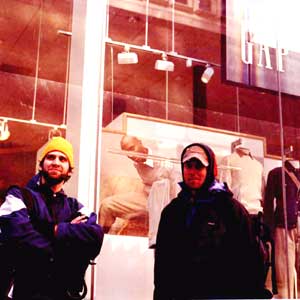 It
turned out that the police had searched the three and their bags,
and confiscated G.W.B.'s drumsticks, using jaywalking as their probable
cause. No doubt, the NYPD was searching for marijuana, and were
probably disappointed to come up empty-handed. Even without weed,
though, the three were still somewhat paranoid. They eyeballed some
nearby cops somewhat nervously while Bea photographed them standing
outside a Gap.
It
turned out that the police had searched the three and their bags,
and confiscated G.W.B.'s drumsticks, using jaywalking as their probable
cause. No doubt, the NYPD was searching for marijuana, and were
probably disappointed to come up empty-handed. Even without weed,
though, the three were still somewhat paranoid. They eyeballed some
nearby cops somewhat nervously while Bea photographed them standing
outside a Gap.
"So,
all this activism and stuff—does it impress the chicks?"
I asked.
"I
don't know, does it?" G.W.B. turned to Bea.
"I'm
not so comfortable with these guys," Bea said to me sotto
voce.
"We
should ditch them," I agreed. To them, I said, "Listen,
we shouldn't travel in a large group. You guys take that side of
the street, we'll take this side."
"Good
idea," he agreed.
Walking
down Lexington, Bea and I heard an amplified voice echoing off the
skyscrapers. We were heading towards the noise when a voice came
out of a group of cops huddled away from the wind in the arcade
of an office building.
"Where
is your jacket, young protestor?" called out a petite policewoman,
who asked us to refer to her as "Officer Smith."
"I'm
not cold," I said through chattering teeth. "And I'm not
a protestor, either. I do a Web site, and I'm writing about the
demonstration. Have any thoughts?"
"Yeah,
let them move to Afghanistan and see how they like it there,"
Officer Smith said.
I had
to admit she had a point.
Talking
to the police around the demonstration, in fact, was an interesting
experience. Once they realized I wasn't out to slander them, they
were quick to open up. And, by listening, I think I gained a better
understanding of the dynamics of what was going on.
The NYPD,
in many ways, are more legitimate working class heroes than the
college kids who had come from out of town to yell their heads off
about globalization. They were blue-collar men and women, just trying
to do their jobs and stay warm. They didn't want to hurt anyone,
and for the most part they supported the right to protest, and thought
freedom of speech was a worthwhile thing to protect. After all,
the police strongly believe in the right to unionize. On the other
hand, they didn't want anyone to hurt the city, either. Enough had
happened on September 11.
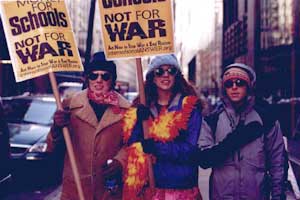 We
thanked "Officer Smith" and her colleagues and moved on.
Around the corner, we found more of what we had been looking for:
sign-carrying protestors straggling in from the west side, being
directed by the police into areas clearly marked off with steel
barriers. We took the opportunity to stop a group of three colorfully
dressed, college-age women carrying "Money for Schools, Not
War" signs. Again, they were not local, but had come down from
Boston expressly for the demonstration.
We
thanked "Officer Smith" and her colleagues and moved on.
Around the corner, we found more of what we had been looking for:
sign-carrying protestors straggling in from the west side, being
directed by the police into areas clearly marked off with steel
barriers. We took the opportunity to stop a group of three colorfully
dressed, college-age women carrying "Money for Schools, Not
War" signs. Again, they were not local, but had come down from
Boston expressly for the demonstration.
"I
think it's a bunch of bullshit that rich people are trying to make
money off the backs of poor people," said one. "The real
suffering takes place in other countries. My solution would be a
more equitable economic system. If everyone got paid the same for
the same time working, you wouldn't have such an accumulation of
wealth in the hands of the elites. But of course, the money goes
into the hands of the investors."
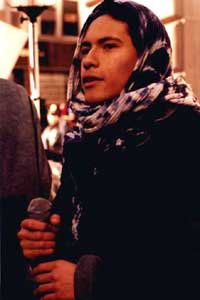 We
thanked the girls and pressed on Park Avenue, where we found the
purpose of the barricades we had noticed earlier. They were set
up along the street, controlling the flow of traffic. Anyone who
wanted to protest had to step, under the watchful eye of the NYPD,
behind the barricades and into a cattle-pen like area. The barriers
effectively controlled the public space, keeping the demonstrators
crammed onto the sidewalks, able to see their compatriots on the
opposite corner, but unable to join them unless they were willing
to walk all the way down the block to cross the street. (The Village
Voice reported what happened when people tried to cross
some barriers, together with some pictures calculated for maximum
shock effect.)
We
thanked the girls and pressed on Park Avenue, where we found the
purpose of the barricades we had noticed earlier. They were set
up along the street, controlling the flow of traffic. Anyone who
wanted to protest had to step, under the watchful eye of the NYPD,
behind the barricades and into a cattle-pen like area. The barriers
effectively controlled the public space, keeping the demonstrators
crammed onto the sidewalks, able to see their compatriots on the
opposite corner, but unable to join them unless they were willing
to walk all the way down the block to cross the street. (The Village
Voice reported what happened when people tried to cross
some barriers, together with some pictures calculated for maximum
shock effect.)
Being
physically separated, however, didn't seem to dampen the enthusiasm
of the groups of protestors, who, despite the freezing weather,
waved their homemade signs and enthusiastically chanted slogans
such as, "Hey, Ho, WEF has got to go!" and "Bush,
Sharon, you can't hide! We charge you with genocide!" The anonymous
police officer we had spoken to earlier was vindicated when someone
took a microphone and, in a Tom-Morello-from Rage-Against-the-Machine-like
voice shouted: "Hey, how many of us are from New York?"
A smattering
of cheers.
"How
many from out of town?"
Thunderous
applause. Pandemonium.
"Uh-how
many of us from NEW JERSEY?!"
Dead
silence.
"New
England?"
The crowd
voiced a collective "Yeah!"
The first
speaker finished, a woman identified as Stephanie from The Women's
Fight Back Network from Simmons College in Boston took the microphone.
"People
are not just losing jobs in Boston," she said. "It's happening
in every city. . . it's caused by the same thing. . . I want to
remind people that it would cost 17 billion to give health care
to every child in America, but it costs 40 billion for this war.
. ."
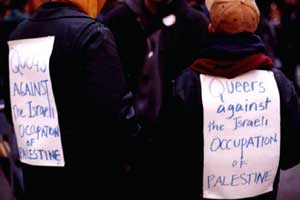 For
a speaker from what seemed to be a feminist group to speak out against
the war in Afghanistan fit with the theme of the event. The demonstrators
carried signs espousing a whole rainbow coalition of left-wing causes,
from environmentalists to socialists to what were apparently both
members of that well-known resistance group Queers Against the Israeli
Occupation of Palestine. (Interesting that they were interested
in the cause of people who would stone them for violating Islamic
law.) One fellow, who earned high scores from the cops and Beatrice
and myself as well, even carried a "More Pay for NYPD"
sign.
For
a speaker from what seemed to be a feminist group to speak out against
the war in Afghanistan fit with the theme of the event. The demonstrators
carried signs espousing a whole rainbow coalition of left-wing causes,
from environmentalists to socialists to what were apparently both
members of that well-known resistance group Queers Against the Israeli
Occupation of Palestine. (Interesting that they were interested
in the cause of people who would stone them for violating Islamic
law.) One fellow, who earned high scores from the cops and Beatrice
and myself as well, even carried a "More Pay for NYPD"
sign.
Searching
through the mob, we finally found some New Yorkers, high school
students from LaGuardia and Brooklyn Tech. Asked why they had come
out today, one ventured: "The people should have a say in the
decision making [instead of the corporate executives]." Another
added, "All these people are warmongering and they support
Bush in his self-important war."
Alan
from Queens, who was handing out literature for the Socialist Alternative,
gave his opinion of the WEF attendees: "I think they're a bunch
of scumsuckers. They're pigs. [The WEF] is a strategic tool of international
capitalism."
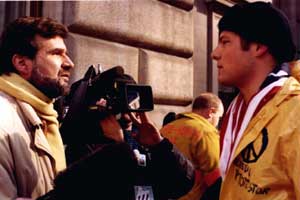 "Real"
reporters, given free access to the proceedings by their press passes,
were interviewing the more colorful demonstrators over the barriers.
I saw one guy from Minnesota, his yellow raincoat decorated with
political stickers, interviewed by a French TV crew. Like so many
of the protestors we had spoken to ourselves, he gave a long, rambling
speech about nothing in particular, about how bad globalization
is. I felt bad for the French reporter trying to get quality material
out of this crowd. He were looking for a José
Bové, the dairy farmer whose crusade for quality
farm products in the face of crappy, mass-produced convenience food
made him a French national celebrity. He wanted someone to say something
concrete, like "Yes, I am protesting these people because my
uncle lost his job when his factory was moved to the Philippines,
where they pay kids two cents an hour to do his job," or "I
am protesting this Forum because my phone service works like shit,
but we can't get anything done because our Congressman sucks the
phone company's dick for his campaign money." Instead, he got
some half-baked conspiracy theory about Israel, Enron, George W.
Bush, and the Gnomes of Zurich. What was happening in that hotel
down the block, in the minds of the crowds, was all the world's
evils lumped together in one building-and they were going to root
it out, consequences be damned.
"Real"
reporters, given free access to the proceedings by their press passes,
were interviewing the more colorful demonstrators over the barriers.
I saw one guy from Minnesota, his yellow raincoat decorated with
political stickers, interviewed by a French TV crew. Like so many
of the protestors we had spoken to ourselves, he gave a long, rambling
speech about nothing in particular, about how bad globalization
is. I felt bad for the French reporter trying to get quality material
out of this crowd. He were looking for a José
Bové, the dairy farmer whose crusade for quality
farm products in the face of crappy, mass-produced convenience food
made him a French national celebrity. He wanted someone to say something
concrete, like "Yes, I am protesting these people because my
uncle lost his job when his factory was moved to the Philippines,
where they pay kids two cents an hour to do his job," or "I
am protesting this Forum because my phone service works like shit,
but we can't get anything done because our Congressman sucks the
phone company's dick for his campaign money." Instead, he got
some half-baked conspiracy theory about Israel, Enron, George W.
Bush, and the Gnomes of Zurich. What was happening in that hotel
down the block, in the minds of the crowds, was all the world's
evils lumped together in one building-and they were going to root
it out, consequences be damned.
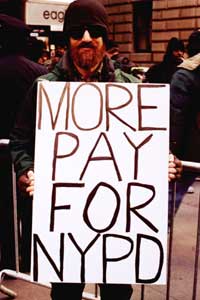 Bea
and I had it when the crowd started shouting about the Palestinian
homeland and Israeli imperialism. Bea grew up in Germany, but her
father is Jewish and she has cousins in Israel. I've never been
to Israel, but I'm both Jewish and know people who have served in
the Israeli Defense Forces. The knee-jerk reaction of the crowd,
as well as the apparent inability of anyone who fancies themselves
a liberal to see more than one side of an issue, really bothered
us.
Bea
and I had it when the crowd started shouting about the Palestinian
homeland and Israeli imperialism. Bea grew up in Germany, but her
father is Jewish and she has cousins in Israel. I've never been
to Israel, but I'm both Jewish and know people who have served in
the Israeli Defense Forces. The knee-jerk reaction of the crowd,
as well as the apparent inability of anyone who fancies themselves
a liberal to see more than one side of an issue, really bothered
us.
"That
does it, dude, we're out of here," Bea said. "Besides,
I'm freezing. Come on, I think there was a Body Shop back there."
I couldn't
argue: the cold wind whipping between the buildings had dried and
chapped our skin, and my knuckles were so swollen I could barely
write. I had to warm up, at least for a few minutes.
We retreated
back up the block to Lexington and stole away from the crowd agitating
for social change by ducking into the warm womb of the Body Shop.
It was as though we'd entered some consumer Paradise. The sweet
odor of incense swept over me, and the New-Agey music they were
playing over the PA lulled away the tension of the mob scene outside.
Nor could any of the protestors outside have found any fault with
the least thing they sold there; it was a retail establishment conceived
in the Garden of Eden. It was everyone's liberal ideas made flesh.
On the wall was a plaque with the store's business principles—nothing
they sold was tested on animals, there were no polluting byproducts
from anything's manufacturing process, and everything was all-natural.
Looking around, I saw shelf upon shelf of tubes and jars of environmentally
correct beauty products, all made from renewable resources grown
by indigenous peoples from third-world countries.
I couldn't
afford any of it.
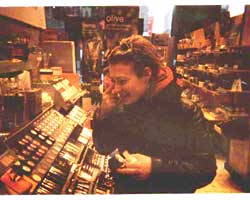 Bea
seized a sample jar of moisturizer and began salving her chapped
lips. I picked a small jar of green goo that cost roughly the same
as my monthly bill from my Web host. "Wow. This is made from
hemp?"
Bea
seized a sample jar of moisturizer and began salving her chapped
lips. I picked a small jar of green goo that cost roughly the same
as my monthly bill from my Web host. "Wow. This is made from
hemp?"
"Yeah,
it's great shit. Here, try this stuff," she sprayed me with
an atomizer.
"Orange,"
I said, wiping the stuff out of my eyes. "I'm probably the
best-smelling person at this protest."
(By the
way, I took the picture of Bea on the left. I deserve major props
for my mad Photoshop skillz for adjusting it until you can actually
see it's her and not, say, Lowtax in a Chewbacca costume.)
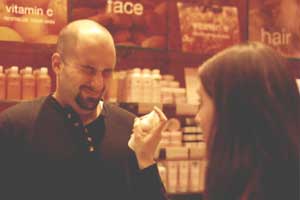 On
our way back to the subway, we passed some college students handing
out socialist newspapers. They looked so earnest, I couldn't resist
asking The Question once again:
On
our way back to the subway, we passed some college students handing
out socialist newspapers. They looked so earnest, I couldn't resist
asking The Question once again:
"So,
does left-wing politics get you chicks?"
They
looked at each other.
"Not
unless you have a tattoo of Marx on your butt," one responded
sadly.
Just
then, some protestors passed by, carrying signs and chanting, "The
People united will never be defeated."
"It's
'never be divided,' you idiots," I muttered under my
breath.
I was
disappointed. The WTF protests were not what I had expected. I went
in expecting clear-cut right and wrong, easily articulated reasons
for why globalization is bad and what we have to do to make the
world better. I thought I would find the stereotypes I'd read about:
brutal police, Gandhi-esque protestors, a battle between the Rebel
Alliance and the Evil Empire. Good against Evil. Instead, I found
people: stupid and falliable, sometimes heroic, but just people.
And, I came to realize, the people inside the Waldorf-Astoria were
just that, as well: people. Some want to do right. Some are too
stupid or lazy to care. And some just want to think of new ways
to make a buck.
I realized
something else, as well: If you're going to stand for a cause, you
ought to be able to articulate what exactly you stand for. Political
decisions should be reasoned, not taken because you're afraid not
to accept the empty rhetoric, or, worse, because you're transfering
your suburban resentment for Mommy and Daddy onto some shadowy authority
figures.
As for
me, I know where my politics lie.
Feedback?
E-mail editor@corporatemofo.com
Posted
February 3, 2002 1:46 AM
Posted
by: Freeman
at February 26, 2008 4:28 PM